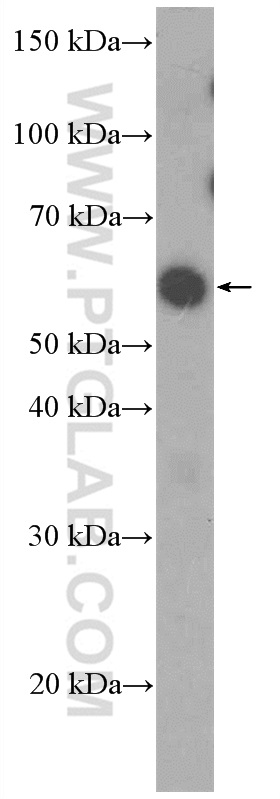验证数据展示
经过测试的应用
| Positive WB detected in | NCCIT cell, NCCIT cells |
推荐稀释比
| Application | Dilution |
|---|---|
| Western Blot (WB) | WB : 1:500-1:1000 |
| It is recommended that this reagent should be titrated in each testing system to obtain optimal results. | |
| Sample-dependent, Check data in validation data gallery. | |
产品信息
20570-1-AP targets PAX7 in WB, IHC, IF, ELISA applications and shows reactivity with human samples.
| Tested Applications | WB, ELISA Application Description |
| Cited Applications | WB, IHC, IF |
| Tested Reactivity | human |
| Cited Reactivity | human, rat, pig, bovine, sheep, goat, duck |
| Immunogen | Peptide 种属同源性预测 |
| Host / Isotype | Rabbit / IgG |
| Class | Polyclonal |
| Type | Antibody |
| Full Name | paired box 7 |
| Synonyms | PAX7B, PAX-7, PAX 7, Paired box protein Pax-7, paired box 7 |
| Calculated Molecular Weight | 57 kDa |
| Observed Molecular Weight | 57 kDa |
| GenBank Accession Number | NM_002584 |
| Gene Symbol | PAX7 |
| Gene ID (NCBI) | 5081 |
| RRID | AB_2878703 |
| Conjugate | Unconjugated |
| Form | Liquid |
| Purification Method | Antigen affinity purification |
| UNIPROT ID | P23759 |
| Storage Buffer | PBS with 0.02% sodium azide and 50% glycerol pH 7.3. |
| Storage Conditions | Store at -20°C. Stable for one year after shipment. Aliquoting is unnecessary for -20oC storage. |
背景介绍
Pax7 is a highly conserved transcription factor involved in early development of the neural crest and gastrulation and is a commonly used marker for satellite cells in muscle tissue. This antibody is specific to PAX7. It will not cross-react with other PAX protein family members.
What is the molecular weight of Pax7?
57 kDa
What is the role of Pax7?
One of the Paired Box (Pax) transcription factors, which are key in early development and organogenesis in vertebrates, Pax7 binds directly to DNA and is key in neural crest induction (PMID: 26410165). One of the earlier markers in this phase of embryogenesis, Pax7 therefore influences the migration and proliferation of multiple lineages of cells (PMID: 22848431).
In adult tissue, Pax7 is expressed by the quiescent resident muscle stem cells, also known as satellite cells, making it a useful marker for this cell type. It is essential for their formation and maintenance in their niche. When activated, these cells can proliferate in the normal maintenance of muscle tissue or respond to injury in repair. The co-expression of Pax7 with MyoD in these activated satellite cells regulates muscle cell proliferation (PMID: 16608873).
What proteins does Pax7 interact with?
An orthologue of Pax7, another transcription factor of the same family, is Pax3. These two proteins can form a heterodimer, binding to DNA to work together in myogenesis but can also function independently and have overlapping roles (PMID: 16380438).
What is the role of Pax7 in disease?
Pax7 and Pax 3 have both been identified in tumor tissue from the childhood cancer alveolar rhabdomyosarcoma (ARMS), which affects skeletal muscle (PMID: 23206814).
实验方案
| Product Specific Protocols | |
|---|---|
| WB protocol for PAX7 antibody 20570-1-AP | Download protocol |
| Standard Protocols | |
|---|---|
| Click here to view our Standard Protocols |
发表文章
| Species | Application | Title |
|---|---|---|
J Extracell Vesicles Extracellular vesicles derived from oesophageal cancer containing P4HB promote muscle wasting via regulating PHGDH/Bcl-2/caspase-3 pathway. | ||
J Cachexia Sarcopenia Muscle circRNAome profiling reveals circFgfr2 regulates myogenesis and muscle regeneration via a feedback loop. | ||
Theranostics Trio cooperates with Myh9 to regulate neural crest-derived craniofacial development. | ||
Front Cell Dev Biol PERK Signaling Controls Myoblast Differentiation by Regulating MicroRNA Networks. | ||
iScience KLF2 in Myeloid Lineage Cells Regulates the Innate Immune Response during Skeletal Muscle Injury and Regeneration. | ||
